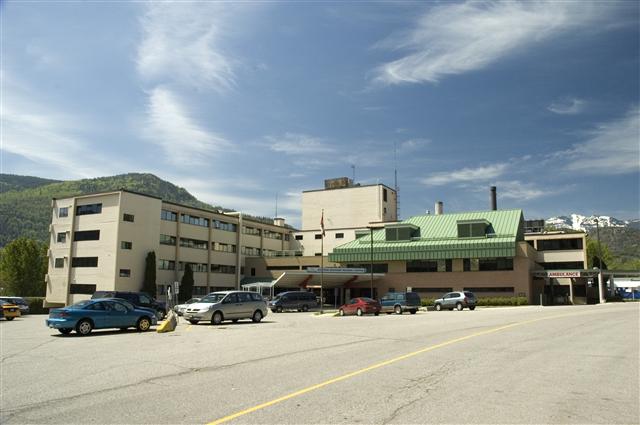INTERVIEW: Dr. Andre De Greef - The doctors strike back
The long-brewing storm of discontent at Kootenay Boundary Regional Hospital has boiled over in the past few weeks, with stories being picked up on provincial and national news broadcasts. Doctors are upset about how Interior Health has been run and how they’ve allotted funds. This, coupled with a lack of dialogue with decision makers and proposed cuts that will inhibit their ability to serve their patients, has cracked the issue wide open for local physicians. The doctors have stated that they are even willing to go so far as to pay for their own nurses in order to provide needed services. Interior Health has responded that have not received any formal proposal. This week, the Telegraph had an in depth chat with Dr. Andre De Greef, head of surgery at KBRH.
You’ve stated that you’re willing to pay for your own nurses. IH says they haven’t heard about it. What is the your next move?
We had a meeting last night (Tuesday) with the regional medical advisory of the Kootenay. This is made up of the entire region including Salmo, Grand Forks, Rossland, Trail, Nelson, Kaslo and all over. We have representatives from all of those areas on this committee. At the general meeting we passed a motion again last night. It was once again a vote of no confidence in what the government is doing to this area and specifically with how it relates to what is going to happen to patients. We feel like we’re being taxed on quality of medical care. That is a very serious accusation. Mr Salekin, the Minister of Health, has said that our area compares very well to other areas with regards to waiting lists and number of surgeries performed. They say we should be quiet and realize that we are better off than other places and other provinces. It is very artificial to say that: he is comparing hip replacements and knee replacements and cataract surgeries. He is not comparing the rest of our work. That’s just 10% of our work. With the other 90% of our work, the waiting lists are extremely long. For example, the waiting list for orthopedic work on shoulders. Patients waiting for that is longer than the entire orthopaedic waiting list at Penticton hospital.
The province has said that waiting lists and times at KBRH are better than the provincial average. Just how many patients do you have on your waiting list?
I have a waiting list of approximately 150 patients. The province says to me, ‘hey, you’ve only got 150 patients waiting’, so at a meeting about four weeks ago I took all of the referrals I have and put them in a big box and took it to the meeting. I showed it to the COO and said there are 2000 referrals. He was shocked because he didn’t think someone would actually bring all of the referrals into the picture. He says I haven’t got a waiting list of more than 150 patients. But what’s the point of me having these 2000 patients if they are going to have to wait years to have the surgery done? They need to give me more operating room time but now they are taking it away. It’s the patients and the people that are suffering. It’s nobody else that suffers but the patients.
Is it an issue of there just not being enough money to offer adequate care or is there another issue behind it?
Well, we realize 40 cents on the dollar in this province is going to health care. We don’t argue that. We don’t think they should be given more money. We think that the money they are given needs to be used better. Use it where it is needed. The feelings are that they are telling us we only have so much money, so that is all we are going to allow you to do. That is wrong. They should think, ‘what is the minimum we need to make health care sustainable in this area?’. From there, convince us what is needed to offer adequate care to our patients. Let’s give them that and then from there see how we can redistribute the money. They are taking money away from patient care.
In other words, we sent the government a motion of no confidence from our local hospital to the minister saying that we do not have any faith in Interior Health the way that you guys are running it. We sent them a notice that we are prepared to help pay for operating room nurses and make this operating room run. That is not going to be accepted because of the Canada Health Act. You cannot put money into a procedure that is already covered by the Medical Services Plan, Health Care Canada, or Health Care B.C.
You can’t put extra money into that and make certain procedures happen before others. They are going to block us on that, I’m sure. So next we put a vote of no confidence in the quality of care we offer. The message from every single possible area is coming, saying that Interior Health is just going to destroy the region by comparing us to the Okanagan. You cannot do that; things are different in a rural area. Patients can’t just go to the next town and be seen there, while in other areas like Vancouver they have many hospitals in the same area.
What result to you expect to get from these most recent motions?
Nobody knows what will happen. The bad thing for us we are sending these messages out and absolutely nobody is coming to speak to us.
If your current efforts are getting ignored what is the next step? What will you have to do to get your message across?
The next step? This will go to a board of directors based in Kelowna and made up of non-medical people and people not involved in Interior Health. They are a way for the public to have insight and some control over health care. If that board gets this letter saying that the quality of care has been impacted at K.B.R.H., it means this is now beyond Interior Health; it’s spreading out into the surrounding areas and people that have a say in government affairs.
We’re hoping that message gets stronger and stronger. It’s a one way ticket out right now with messages out but no messages back from the minister. In fact, the minister is using statistics from a number of years ago and only particular procedures. It’s not looking at all of the procedures and it is not looking at the whole situation.
In an ideal world what do you see as the outcome of this situation?
All we want is for them to sit down and discuss it with us. Tell us why they are doing these changes and for us to explain to them that they cannot look at just the dollars and cents. They have to look at the care of the patients. If they persist with this then simply we will not have a regional hospital anymore. We will have days when there is no cover for certain procedures, no anaesthetic cover, no orthopaedic cover. It’s going to happen. How dare they want to create a situation where that can happen?
How long will you wait without hearing anything back from Interior Health before going to plan B? And do you have a plan B?
The only thing that can make this even better is for the public to rally behind us as well. Sure, the public says they support us. There has been basically a Trail-based effort to stop these changes. It’s spreading out now in waves, though. The waves are circling out and for the first time ever in this last six months Nelson has come on board. At least people like the Nelson hospital are coming on board and other medical communities are realizing that this is the place that they get their patients. They could sit out and wait and see what will happens and maybe more services will come to the area. That is never going to happen. In the medical community, this story is really becoming a big wave.
We don’t go around asking patients to write letters. Doctors don’t do that kind of thing. In reality, that is what will help, though. If patients write letters like, ‘this is me. I lost my leg and there was no way of getting me ready to go work again and these guys got me better at K.B.R.H.’ We need the patients and the community to get involved. That is the next step: for the public to rally behind the medical community.
So do we need more money for IHA, a whole new way to run it, or to scrap the whole system and start from scratch?
The money being put into it is enough. It’s not being spent correctly. They have huge amounts of administrators and huge amounts of non-medical people that are making decisions where money is being spent in the system. They should not do that. If you ask me where the money is going, this message is being sent to the regional quality control and the regional committee running Interior Health. They then sit in early April. If they make recommendations, that will go straight to the minister and they cannot ignore that any more. It’s no longer an internal Interior Health thing then–it is beyond them and at the Ministry of Health.
What we’re proposing is that they negotiate. For seven months, we’ve been trying to negotiate. We’ve anticipated their moves and we source-solved the problems. We anticipated they needed to save money and we saved money. You anticipate by looking at ICBC, WCB, and all of those funding sources. That is money coming into the hospital that they are not considering which helps pay for the services we provide in the community.
That money is not going to the right places. They must realize that where there is smoke there is fire. They cannot ignore us; they have to come and negotiate with us. We want a say in where the money goes. Up to now, doctors have just accepted what governments have done. But these latest moves have gone too far. We are saying, ‘you have pushed us to the limit, you have cut down to the bone, and now it’s impacting on the care that we give our patients’. We can’t allow that and call ourselves doctors. If we allow that, we will be getting Third World medical care here.
We, as doctors, care a lot about our patients. We don’t want that. That’s why we want them to come and negotiate with us. They say they have money issues, but let’s solve them together. You can’t cut only certain core services.
How long are you prepared to continue on as-is without a resolution?
If they ignore us, then we’ll have to break the system. Then out of the ashes something else will rise. We don’t want to go that far, though; it’s not necessary to go that far. They don’t want it to look as if they are giving in, but there is a right way to make it a win-win–and that is together at the negotiation table.


























Comments